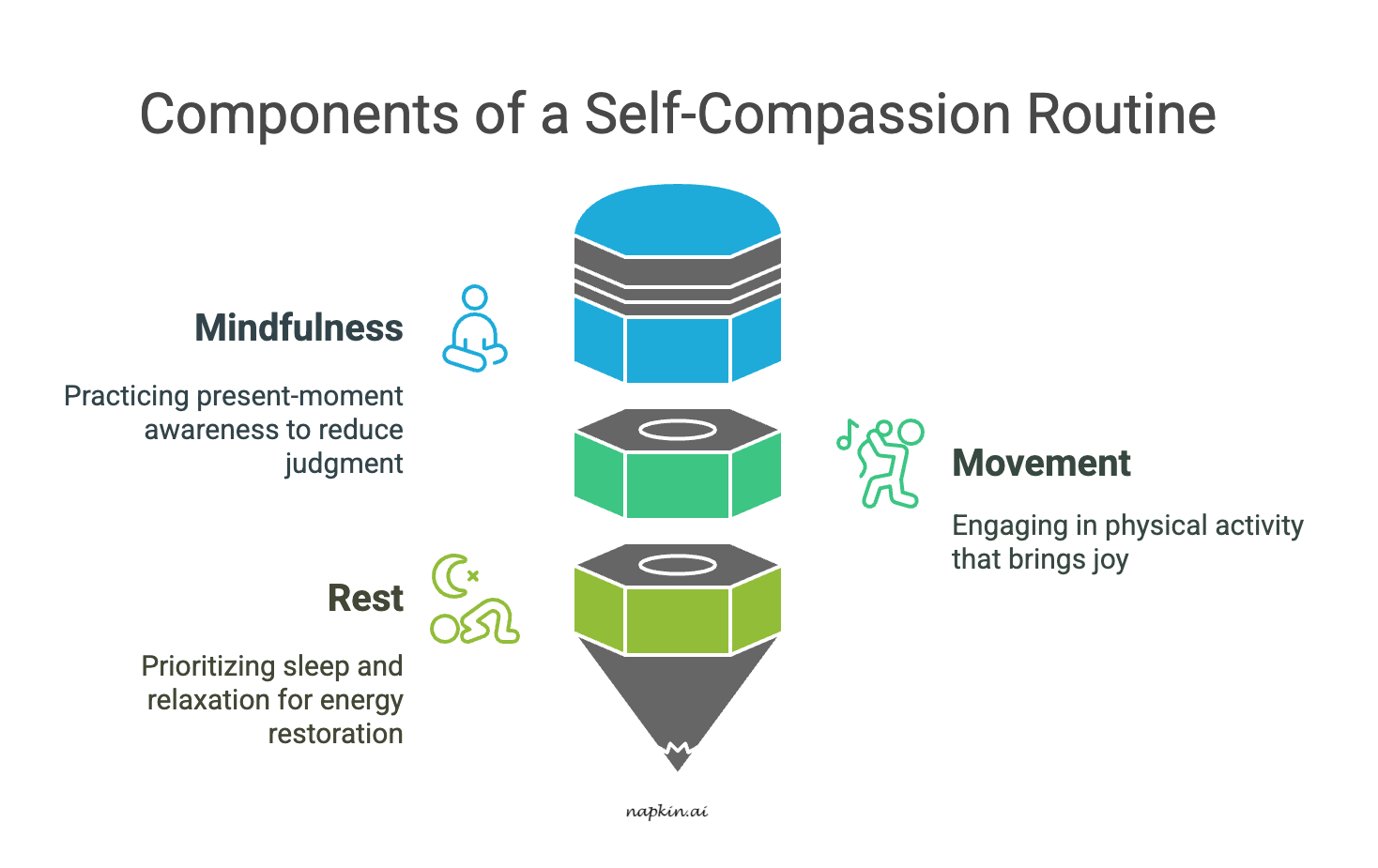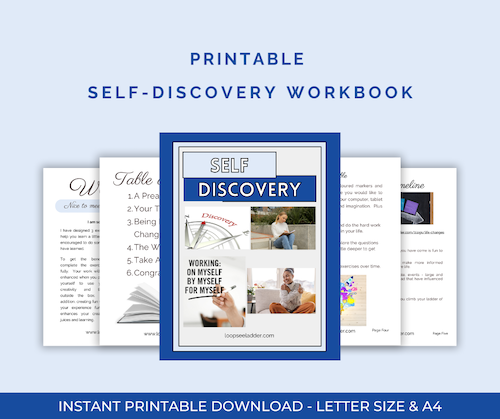Embracing Imperfection and Loving Yourself Anyway
As we age, many women struggle with the perfectionism society often expects, especially in our 50s and 60s.
Instead of focusing on what you haven't achieved or your mistakes, let self-compassion teach you that loving yourself anyway, imperfections and all, is the best route.
Summary: This post invites women 55+ to shift from self-criticism to self-compassion. It explores how lifelong perfectionism and cultural pressure impact mid-life and beyond, and offers practical steps to embrace imperfections, treat oneself with kindness, develop a self-care routine rooted in self-worth, set healthy boundaries, and forgive oneself for past mistakes. The underlying message: Loving yourself as you are is the gateway to freedom, joy and empowerment in this next chapter.
A Preamble
Life is messy.
It’s beautiful and challenging, rewarding and demanding. Yet, as we age, many women struggle with the perfectionism society often expects, especially in our 50s and 60s. In reality, self-compassion is one of the most powerful tools we can embrace.
Instead of focusing on what you haven't achieved or your mistakes, let self-compassion teach you that loving yourself anyway, imperfections and all, is the best route. This is particularly transformative for women 55+ who may feel as if they are in a season of transition or dealing with the changing nature of life.
So, what does it mean to truly embrace self-compassion and practice self-love, especially as we face the challenges of aging, health, family dynamics, and even our inner critics?
Allow self-compassion to teach you that loving yourself anyway, regardless of imperfections, is the route to take,
This is particularly transformative for women 55+ who may feel as if they are in a season of transition or dealing with the changing nature of life.
Understanding Self-Compassion and Loving Yourself Anyway: Why It's Crucial After 55
Self-compassion and self-love are often misunderstood. Many women confuse it with self-indulgence or self-pity, but it’s the opposite. Self-compassion is about treating yourself with kindness, patience, and care, especially when life feels imperfect. It’s about giving yourself the love and forgiveness you would offer a dear friend.
Take Diane, a 58-year-old woman who recently transitioned to part-time work after her children moved out. She had spent her entire life putting others first, but she struggled to adjust once her children were no longer dependent on her. Diane had trouble balancing feelings of loss with a sense of purpose. By practicing self-compassion, Diane began to change how she viewed herself. Instead of focusing on what was missing, she began to acknowledge her achievements: raising a family, contributing to her community, and thriving through significant life changes. By practicing self-compassion, she began to embrace the imperfections in her life and love herself for the journey.
Self-compassion and self-love is often misunderstood.
Self-compassion is about treating yourself with kindness, patience, and care, especially when life feels imperfect.
How to Cultivate Self-Compassion
It’s one thing to talk about self-compassion, but how do we practice it, especially when we're used to being hard on ourselves? Below are some actionable steps that will allow you to embrace self-compassion for women 55+ with a practical, intentional approach:
1. Challenge Your Inner Critic
The first step to self-compassion is to notice when you’re overly critical of yourself. For many women, especially after 55, we’ve had decades of internalized messages about what should or shouldn’t be. But it’s essential to reframe those negative thoughts and love yourself.
Practical Tip: Next time you think, “I should have done that differently,” replace it with “I did the best I could with what I knew at the time.” This slight shift helps you recognize that you are human, not a perfect machine.
2. Embrace Your Imperfections
We live in a world that often prizes perfection—perfect bodies, perfect careers, perfect relationships—but the truth is, imperfection is a part of life. When you embrace your imperfections, you free yourself from the unrealistic pressure of always being perfect.
Real-Life Example: After turning 55, my friend Carol noticed that her health wasn’t what it used to be. She had gained weight, and she struggled with arthritis. At first, she was upset, but she eventually embraced her new reality. Rather than focusing on the things she couldn’t change, she shifted her mindset to appreciating her body for what it was capable of. She began practicing yoga for flexibility and found ways to enjoy movement without guilt. She loved herself through the changes.
We live in a world that often prizes perfection—perfect bodies, perfect careers, perfect relationships.
The truth is, imperfection is part of life. When you embrace your imperfections, you free yourself from the unrealistic pressure of always being perfect.
3. Develop a Self-Care Routine That Reflects Self-Compassion
It’s easy to fall into the trap of “taking care of everyone else,” but self-care is an act of self-compassion and self-love. You must dedicate time to your mental, emotional, and physical well-being.
Practical Tips:
Mindfulness: Start your day with a few minutes of mindful breathing or meditation. Focus on the present moment and allow your thoughts to flow without judgment.
Movement: Whether it’s a short walk, stretching, or dancing around the house, find something that brings you joy and allows you to appreciate your body.
Rest: Honour your need for sleep and relaxation. As we age, our bodies require more rest to restore energy.
It’s easy to fall into the trap of “taking care of everyone else.”
But self-care is an act of self-compassion. You must dedicate time to your mental, emotional, and physical well-being.
4. Set Boundaries with Compassion
Part of self-compassion is learning how to say no without guilt. As women 55+, we’ve often prioritized others over ourselves. You must recognize that you deserve time and energy for your well-being.
Real-Life Anecdote: Judith, a 62-year-old woman, found herself overcommitted to social gatherings, volunteer work, and family responsibilities. She was exhausted and resentful. After learning about the power of self-compassion, she began setting clear boundaries. She began saying “no” to things that drained her and “yes” to activities that nourished her soul. Judith felt rejuvenated and more at peace, with more energy for the things that truly mattered to her.
5. Forgive Yourself
Forgiving yourself for past mistakes is one of the most critical aspects of self-compassion. At any stage of life, we all have moments we wish we could change. But self-compassion teaches us that our mistakes do not define us.
Practical Tip: Take a moment to reflect on past regrets. Instead of criticizing yourself, say, “I forgive myself. I am learning, and I am enough.”
Forgiving yourself for past mistakes is one of the most critical aspects of self-compassion.
Self-compassion teaches us that our mistakes do not define us.
Why Self-Compassion is Essential for Women 55+
Women over 55 often face unique challenges, such as health issues, shifting family dynamics, and navigating retirement or career changes. The constant pressure to be perfect can be overwhelming, leading to stress, burnout, and dissatisfaction. But by practicing self-compassion, you can ease the mental burden of perfectionism and reclaim your peace. It’s about accepting where you are now, not where you think you “should” be.
When you embrace your imperfections, you free yourself to live a life whole of grace, self-love, and empowerment.
Women over 55 often face unique challenges.
But by practicing self-compassion, you can ease the mental burden of perfectionism and reclaim your peace.
Ready to Embrace Self-Compassion?
Self-compassion is a practice, not a destination. It takes time, patience, and commitment, but the rewards are immense. By embracing your imperfections and loving yourself anyway, you create space for more joy, health, and peace.
Call to Action: Start your self-compassion journey today! Download Master Your Next Chapter - Thriving After 55 to discover how to integrate self-compassion into your daily routine. Take the first step towards a more empowered and loving life.
Let’s unlock the power of self-compassion together! You deserve to love yourself fully, just as you are.
Self-compassion is a practice, not a destination.
By embracing your imperfections and self-love anyway, you create space for more joy, health, and peace.
Resources for YOU:
Digital Download to support you: Benefits of Mindset Mastery Guide
Digital Download to support you: The Ultimate Guide to Intentional Living
From Prime Women - Margery Miller: What (Really) Goes Into Life Over 50 That Works: Self-Love
From Beautiful Midlife - Tania Dalton: Rediscover Your Energy, Confidence, and Joy
FAQ
Q: Who is this article for?
A: Women aged 55+ who are ready to release the weight of perfection, self-criticism and old “shoulds,” and move into self-compassion and self-love.
Q: What does “self-compassion” mean here?
A: It means treating yourself with the same kindness, patience and care you would offer a dear friend—especially when you make mistakes, age changes, or life shifts challenge you. Q:
What practical actions are included?
A: Among others: noticing your inner critic and reframing self-talk; embracing physical and emotional imperfections rather than hiding them; designing a self-care routine that reflects this kindness; setting boundaries to protect your energy; and practising self-forgiveness for past regrets.
Q: Will this help even if I’ve always been hard on myself?
A: Yes. The article emphasizes that self-compassion is a practice—not a once-and-done event—and that it’s never too late to begin rewriting your inner narrative.
Q: Does this replace professional therapy or support for deep issues?
A: No. This work offers mindset and lifestyle tools tailored for women 55+. If you’re facing significant trauma, persistent mental-health concerns, or major transitions, professional support is still advised.
👉 I thoughtfully use AI tools to polish my writing, but every story comes from my lived experience.







































